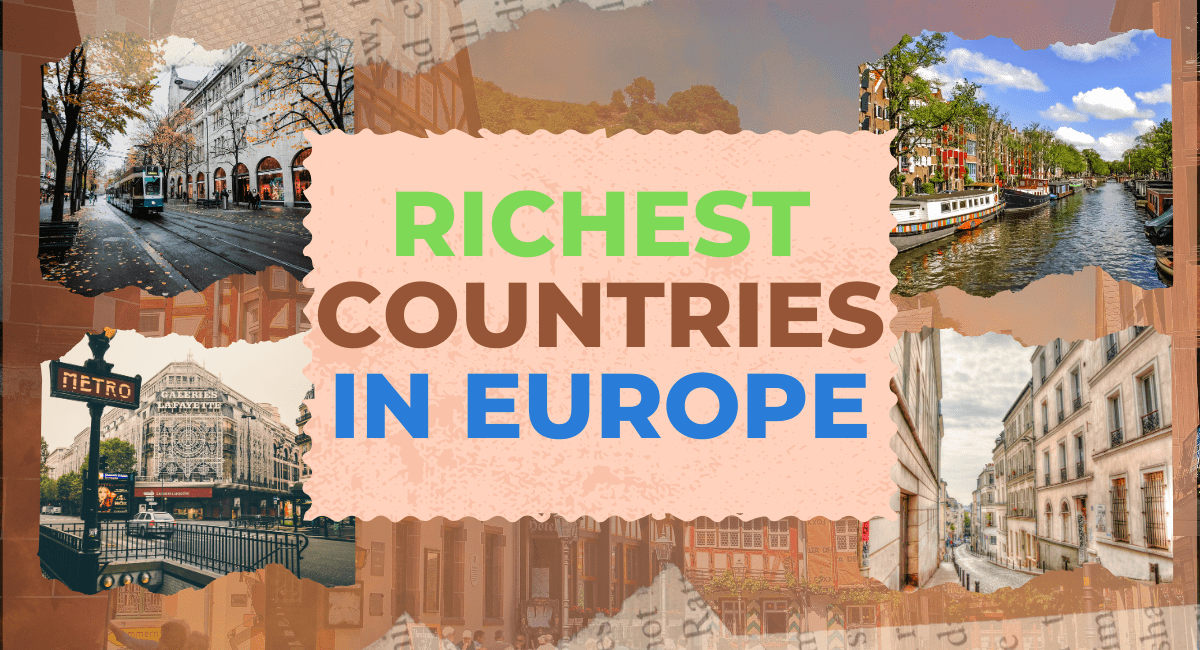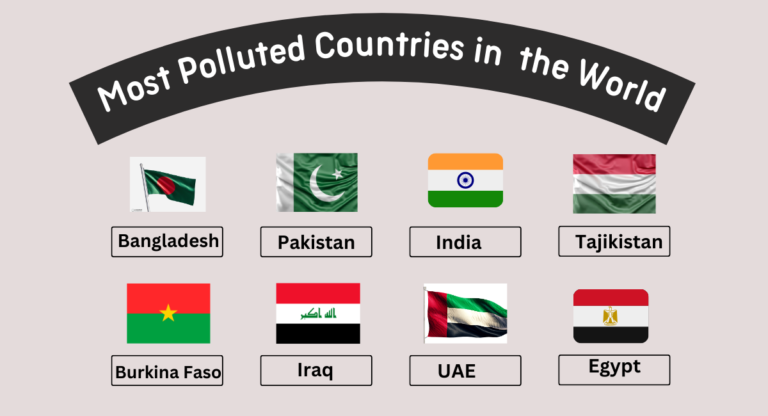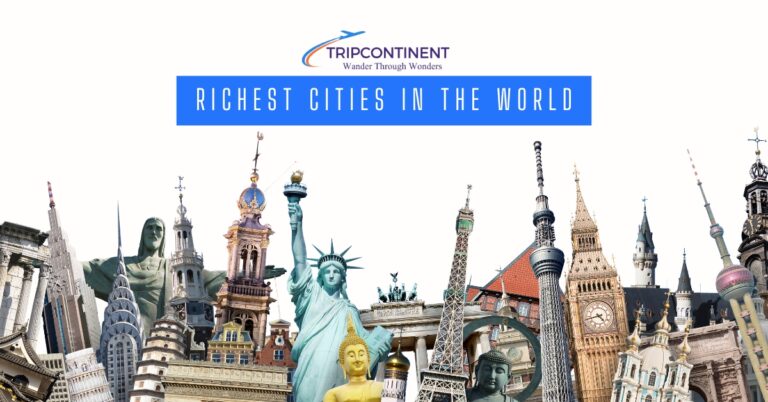11 Most Richest Countries in Europe in 2024
Europe is a continent brimming with history, culture, and innovation. Beyond its captivating landscapes and architectural marvels lie some of the world’s most prosperous economies. This blog delves into the factors that contribute to the wealth and economic success of the Richest Countries In Europe.
We’ll explore the unique blend of strategic location, robust industries, skilled workforces, and social well-being that propel these countries to the forefront of global economic strength. By examining these factors, we can gain valuable insights into the recipe for economic prosperity in today’s interconnected world.
List of the Richest Countries in Europe
The following is the List of the Richest Countries in Europe:
- Luxembourg
- Ireland
- Norway
- Switzerland
- Netherlands
- Iceland
- Sweden
- Germany
- Austria
- Denmark
- Belgium
1. Luxembourg
Luxembourg might be small in size, but this Western European nation packs a powerful economic punch. Nestled in the heart of the continent, Luxembourg isn’t just geographically well-positioned, it’s become a financial powerhouse thanks to a combination of smart strategies and a stable environment.
The country has cultivated a sophisticated and well-regulated financial sector, attracting over 140 banks and boasting the world’s second-largest investment fund industry (right behind the US). Favorable tax policies and strong regulations make Luxembourg a magnet for international businesses and investors, contributing significantly to the country’s overall wealth.
Luxembourg isn’t just wealthy, it’s also incredibly stable. A strong legal system and a government that actively supports businesses create a predictable and secure environment for companies to thrive. Low corporate taxes and various incentives make it an attractive location for companies to set up headquarters, particularly in sectors like technology, logistics, and e-commerce. Amazon and Skype – have both chosen Luxembourg for a significant part of their operations.
Luxembourg’s central location in Europe makes it a dream spot for logistics and trade. Excellent transportation infrastructure, including an international airport, major rail networks, and connections to key European highways, allows for the seamless movement of goods and people across the continent. This strategic location further enhances Luxembourg’s appeal as a business hub.
Luxembourg’s wealth isn’t just concentrated at the top, the country boasts a high standard of living for its residents. Excellent healthcare, education, and social services ensure a good quality of life. Low unemployment rates and a highly skilled workforce further contribute to this economic success story.
While the financial sector remains a cornerstone of the economy, Luxembourg is wisely diversifying. The country is actively investing in cutting-edge technologies like fintech, cybersecurity, and even space exploration. The Luxembourg Space Agency, established in 2018, reflects the nation’s ambition to become a leader in the commercial space industry.
Also read: Most Educated Countries In The World
2. Ireland
Ireland, the land of rolling green hills and rich history, has also become a leader in the global economic landscape. This relative newcomer to the ranks of the world’s wealthiest nations has seen impressive growth, and the reasons behind this success story are multifaceted.
Ireland’s economic rise, particularly since the 1990s, has been nothing short of remarkable. This period, often referred to as the “Celtic Tiger” era, witnessed a surge in growth fueled by smart domestic policies, a surge in foreign investment, and its integration into the European Union.
One of the biggest drivers of this growth has been Ireland’s attractiveness to multinational corporations. The country boasts a highly competitive corporate tax rate, one of the lowest in Europe, making it a prime location for companies to set up shop.
Tech giants like Apple, Google, and Facebook are just a few of the major corporations that have established a significant presence in Ireland. This influx of foreign investment has created a wealth of jobs, boosted the technology and pharmaceutical sectors, and significantly increased Ireland’s export revenue.
Ireland understands that a skilled workforce is vital for a thriving economy. The country heavily invests in education and training programs, ensuring a steady pipeline of talented individuals to meet the demands of its growing industries. Universities and research institutions in Ireland also collaborate closely with businesses, fostering a dynamic environment of innovation and development.
Being a member of the European Union offers significant advantages for Ireland. Access to the single market facilitates trade and investment with other EU countries, creating a vast and interconnected market for Irish goods and services. EU membership also provides crucial structural funds and subsidies that have supported vital infrastructure development and economic modernization efforts.
Ireland has cultivated a business-friendly environment that makes it easy for companies to operate and thrive. The government actively promotes the country as an attractive investment destination, offering incentives and support systems for new businesses. Efficient legal and administrative systems further streamline business operations and encourage entrepreneurship.
Ireland’s economy is heavily reliant on exports, with a particular focus on high-value industries like pharmaceuticals, medical devices, and information technology. These sectors contribute significantly to the country’s GDP and provide a buffer against fluctuations in the domestic economy.
Ireland recognizes the importance of innovation and research for sustained economic success. The country actively invests in research and development across various sectors, fostering a culture of innovation. Numerous research centers and innovation hubs, particularly in biotechnology, information, and communication technology (ICT), and renewable energy, are driving technological advancements and economic diversification.
3. Norway
Norway, a land of breathtaking fjords and stunning landscapes, is also a global leader in wealth and economic prosperity. But how did this nation achieve such remarkable success? The answer lies in a multi-pronged approach that balances resource management, social well-being, and a sustainable future.
The discovery of vast oil and gas reserves in the North Sea completely transformed Norway’s economy in the late 1960s. This industry became a cornerstone of national wealth, generating significant income through exports. Companies like Statoil (now Equinor) played a key role in extracting and exporting these resources. However, Norway didn’t stop there. The government implemented wise management strategies to ensure these resources benefited the nation in the long term.
Norway established the Government Pension Fund Global, also known as the Oil Fund. This massive fund, the world’s largest of its kind, cleverly invests the surplus revenue generated from oil and gas. By investing in a diversified portfolio of international assets, the Oil Fund safeguards these resources for future generations. This approach promotes long-term economic stability and avoids dependence on a single resource.
Norway prioritizes the well-being of its citizens. An extensive social welfare system provides comprehensive healthcare, education, and social security. While this system is funded by high taxes, it ensures a remarkably high standard of living for all Norwegians. The country consistently ranks at the top of the Human Development Index (HDI), a testament to its commitment to social well-being.
While Norway benefits from its oil and gas reserves, it’s also a champion for renewable energy. Hydropower is the star of the show, with nearly all of Norway’s electricity generated from renewable sources, primarily through hydroelectric plants. This dedication to sustainability not only reduces environmental impact but also prepares the economy for a future less reliant on fossil fuels.
Norway boasts a robust mixed economy with low unemployment and high wages. Beyond its natural resources, the country has a well-developed industrial base, including strong shipping, maritime industries, and advanced manufacturing sectors. A focus on productivity, innovation, and a flexible labor market further contributes to economic resilience and growth.
Norway’s political stability and transparent governance are hallmarks of its prosperity. The country enjoys low levels of corruption and a high degree of trust in public institutions. The Norwegian model of social democracy emphasizes an equitable distribution of wealth and resources, promoting social cohesion and economic stability.
Norway recognizes that its greatest resource is its people. The country heavily invests in education, ensuring a well-educated and skilled workforce. Free higher education and strong vocational training programs equip Norwegians with the skills needed to thrive in a competitive global economy. Investment in research and development further fosters innovation across various sectors.
Also explore: Coldest Countries in the World
4. Switzerland
Switzerland, a nation synonymous with stunning scenery and chocolate, is also a global leader in wealth and economic prosperity. Major banks like UBS and Credit Suisse attract international clients with a wide range of services, from private banking to wealth management and investment banking. Strict regulations ensure the integrity and reliability of Swiss financial institutions, fostering trust and confidence.
Switzerland’s long history of political neutrality and stability has created a fertile ground for economic growth. Unlike many nations, Switzerland has stayed clear of major conflicts, fostering a sense of security and predictability. This peaceful environment makes it highly attractive to foreign investors and multinational corporations seeking a haven for their business operations.
Furthermore, Switzerland’s unique system of direct democracy allows citizens to actively participate in decision-making, promoting social cohesion and stable governance.
Switzerland’s commitment to education is another key factor in its economic success. The country boasts a world-class education system, with universities and technical institutes like ETH Zurich consistently ranking among the best globally. These institutions foster innovation and cutting-edge research, ensuring a steady stream of highly skilled professionals.
The Swiss apprenticeship system further strengthens the workforce by providing practical training in various trades, leading to high productivity and a competitive edge in the global marketplace.
Switzerland consistently tops the charts on Global Innovation Indexes, fueled by significant investments in research and development. Collaboration between academia and industry plays a crucial role in driving innovation across various sectors. Think world-renowned companies like Novartis, Roche, and Nestlé – all Swiss leaders in their respective fields! From pharmaceuticals and precision instruments to high-tech manufacturing, Switzerland is at the forefront of cutting-edge advancements.
Switzerland is also a major tourist destination. Millions flock to Switzerland each year to experience its breathtaking landscapes, charming ski resorts, and rich cultural heritage. The Swiss reputation for exceptional hospitality and top-notch infrastructure further enhances the appeal of tourism, making it a significant contributor to the national economy.
Switzerland’s reputation for neutrality extends beyond politics. The country is a prominent international diplomatic hub, hosting numerous international organizations like the United Nations and the International Red Cross, particularly in Geneva. This unique status not only strengthens Switzerland’s global influence but also opens doors to new economic opportunities.
Switzerland thrives on a robust export economy. High-value goods like pharmaceuticals, chemicals, watches, and machinery are major exports, contributing significantly to the national income. Free trade agreements and Switzerland’s membership in the European Free Trade Association (EFTA) further streamline international trade and business partnerships.
5. Netherlands
The Netherlands, a land of windmills, tulips, and historical charm, is also a global leader in wealth and economic success. The Netherlands’ strategic position on the North Sea coast is a game-changer. Rotterdam, Europe’s biggest port, and Amsterdam’s Schiphol Airport are like busy traffic circles for international trade. The country’s impressive infrastructure, with its network of roads, railways, and canals, further cements its role as a major trade and transportation center.
The Dutch economy is a vibrant mix of industries, from finance and technology to agriculture and manufacturing. The Netherlands, despite its small size, is the world’s second-largest exporter of agricultural products. Amsterdam is a magnet for international banks and financial institutions, making it a major financial center. The Netherlands heavily invests in research and development, constantly pushing the boundaries in high-tech systems, chemicals, and life sciences.
The Netherlands rolls out the red carpet for businesses. Competitive tax rates, a strong legal system, and a stable political climate create a highly favorable environment. The country consistently ranks high in ease of doing business, attracting multinational corporations and fostering a spirit of entrepreneurship. Many global giants like Shell, Philips, and Unilever have either their headquarters or significant operations set up in the Netherlands.
The Dutch education system is a top performer on the world stage. This translates into a highly skilled and multilingual workforce. Renowned universities and research institutions fuel innovation and knowledge creation. The focus on education and vocational training ensures a steady stream of talented individuals across various industries.
The Netherlands consistently ranks at the top in terms of quality of life. Excellent healthcare, education, and social security systems contribute to this enviable standard of living. Add to that a well-developed public infrastructure and a clean environment, and you have a highly attractive place for both professionals and businesses to set up roots.
The Netherlands is a frontrunner in sustainability and innovation. They proactively tackle environmental challenges by investing in renewable energy, sustainable agriculture, and cutting-edge water management solutions. Dutch expertise in water technology and environmental engineering is recognized worldwide, contributing to both domestic prosperity and international business opportunities.
The Netherlands has a long and rich history of international trade and diplomacy. As a founding member of the European Union, the Eurozone, and the World Trade Organization, they play a significant role in shaping international trade policies. This outward-looking approach strengthens their economy and solidifies their position as a global trade hub.
Also read: Safest Countries in the World
6. Iceland
Iceland, a land of fire and ice nestled in the North Atlantic, boasts not just stunning landscapes but also an impressive economic standing. Iceland’s wealth is deeply rooted in its abundant renewable energy resources. The geothermal power plants and hydroelectric dams take care of nearly all its electricity needs. This not only translates to clean and affordable energy for Icelanders but also attracts energy-intensive industries like aluminum smelting. By relying on sustainable sources, Iceland reduces dependence on fossil fuels, promoting economic stability and environmental responsibility.
The ocean has played a vital role in Iceland’s economic story for centuries. The country’s rich fishing grounds are teeming with fish, a major export product. Sustainable fishing practices and responsible management of marine resources ensure the long-term viability of this sector. If you love seafood, Iceland’s exports likely grace your table – fish and seafood are a significant contributor to the national income.
In recent years, tourism has become a major economic driver for Iceland. The country’s dramatic landscapes, from majestic glaciers and cascading waterfalls to geothermal wonders and volcanic activity, attract millions of visitors annually. Tourism generates significant revenue and creates jobs across various sectors like hospitality, transportation, and retail. This thriving industry has diversified the economy, making it less reliant on traditional sectors.
Iceland consistently ranks high in global quality of life indices. The country offers excellent healthcare, education, and social security systems, ensuring a high standard of living for its citizens. While high taxes fund this robust social welfare system, the comprehensive services provided contribute to overall well-being and economic stability.
Iceland benefits from a stable political climate and transparent governance. The country boasts low levels of corruption and a high degree of trust in public institutions. Effective governance and sound economic policies have played a crucial role in Iceland’s recovery from the 2008 financial crisis and in building a more resilient economy.
Innovation and technology are increasingly important for Iceland’s continued economic growth. The country is actively investing in various high-tech industries, including biotechnology, information technology, and renewable energy research. By adopting an innovative approach to utilizing its natural resources and investing in new technologies, Iceland is paving the way for sustainable economic development.
7. Sweden
Sweden, a land of Vikings, fjords, and stunning natural beauty, is also a global leader in economic prosperity and social well-being. Sweden’s economy is a vibrant mix of industries, from manufacturing giants like Volvo and IKEA to cutting-edge technology companies like Ericsson and Spotify. This diversity ensures the economy can adapt to changing global markets. Furthermore, Sweden places a high value on research and development (R&D), constantly pushing boundaries in innovation. This focus on new ideas keeps the Swedish economy growing and competitive.
The country boasts one of the best education systems in the world, offering free education at all levels, including universities. This emphasis on education translates into a highly skilled and knowledgeable workforce. Sweden’s universities and technical institutes are renowned for their research and innovation, fostering a culture of continuous improvement and technological advancement.
Sweden is well-known for its comprehensive social welfare system. Think extensive social security, healthcare, and education services, all funded through relatively high taxes. While the taxes may seem high, the system ensures a high standard of living and social equality for all Swedes. This strong social safety net acts like a safety cushion, allowing people to take risks, pursue education, and contribute more to the economy without fear of falling behind.
Sweden is a champion for environmental responsibility. The country has set an ambitious goal of becoming carbon neutral by 2045 and has heavily invested in renewable energy sources like hydropower, wind, and biomass. This commitment to sustainability not only benefits the environment, but also creates economic opportunities in the green technology sector.
Sweden’s political stability and transparent governance create a solid foundation for economic success. The country enjoys low levels of corruption and a high degree of trust in public institutions.
Sweden has a long history of international trade, with a strong export-oriented economy. Think machinery, cars, telecommunication equipment, and pharmaceuticals – these are just some of the high-quality Swedish products gracing markets worldwide. Sweden’s membership in the European Union further strengthens its economic position by facilitating trade and cooperation with other EU member states.
Sweden consistently ranks high in global quality of life indices. Excellent healthcare, education, and social security systems contribute to this enviable standard of living. Add to that a clean and safe environment, low crime rates, and a strong emphasis on work-life balance, and you have a country that attracts skilled professionals from around the world. A happy and healthy workforce is, after all, essential for a thriving economy.
8. Germany
Germany, a land of historic castles, vibrant festivals, and scenic landscapes, is also a global leader in economic strength. Germany’s economic engine is driven by a robust manufacturing sector. German companies like Volkswagen, Siemens, and BASF are leaders in their respective fields, exporting high-quality goods ranging from cars and machinery to chemicals. This focus on precision and innovation ensures global demand for German products.
Germany’s economic strength isn’t just about big corporations. A network of small and medium-sized enterprises (SMEs), known as the Mittelstand, forms the backbone of the economy. These family-owned businesses often specialize in niche markets, driving innovation and creating significant employment opportunities.
Germany is a hotbed for innovation and technology. The country heavily invests in research and development (R&D), making it a frontrunner in various technological advancements. From engineering marvels in automobiles to cutting-edge solutions in renewable energy and healthcare, German institutions like the Fraunhofer Society and the Max Planck Institutes are constantly pushing the boundaries of what’s possible.
Germany’s education system is a key factor in its economic success. The focus isn’t just on theoretical knowledge, but also on practical skills. The dual education system combines classroom learning with apprenticeships, ensuring a steady stream of highly skilled workers perfectly suited for the demands of advanced industries.
Germany is a champion of international trade. As the world’s third-largest exporter, the country benefits from a strong global trade network. Think automobiles, machinery, chemicals, and electronics – these are just some of the high-quality German products gracing markets worldwide. Being a key player in the European Union further strengthens Germany’s economic position by facilitating trade and cooperation with other member states.
Germany’s political stability and efficient governance create a solid foundation for economic success. The country’s political system allows for effective policy-making and implementation, fostering a favorable environment for businesses to invest and operate. Low levels of corruption and a high degree of trust in public institutions further contribute to economic stability.
Germany boasts one of the most advanced infrastructures in the world. Imagine an intricate network of highways, railways, and airports seamlessly connecting people and goods. This efficient infrastructure ensures smooth logistics and supply chains, facilitating both domestic and international trade.
Germany’s social market economy is a winning formula. It combines the dynamism of free-market capitalism with robust social policies like healthcare, education, and social security. This model promotes social equity and high living standards, contributing to overall economic stability and a happy workforce.
Germany is a champion of environmental responsibility. The country is committed to transitioning to a low-carbon economy, with significant investments in wind, solar, and other renewable energy sources. This “Energiewende” (energy transition) policy aims to reduce greenhouse gas emissions and create new economic opportunities in green technologies.
9. Austria
Austria, a land of charming villages, majestic mountains, and rich cultural heritage, is also a world leader in economic prosperity. Austria’s economy is a vibrant mix of industries, from advanced manufacturing in machinery, steel, and chemicals to a well-developed service sector encompassing banking, insurance, and tourism. Imagine a strong foundation with various sectors contributing – that’s the Austrian economic model.
Austria’s position in Central Europe makes it a crucial center for trade. Think efficient highways, railways, and airports – Austria boasts excellent transport infrastructure, allowing for the smooth movement of goods and services across borders. Being a member of the European Union further strengthens Austria’s economic position by providing access to a large market and fostering trade opportunities.
Austria has a long and proud history in manufacturing. Major players like Voestalpine and Magna Steyr are key contributors to the global market in industries like automobiles, electronics, and machinery. The Austrian focus on high-quality production and innovation ensures they stay competitive and their exports are in high demand.
Austria recognizes that its greatest asset is its people. The country boasts a well-regarded education system that produces a highly skilled and educated workforce. Austrian universities and research institutions further contribute by fueling innovation and technological advancement.
Tourism is a cornerstone of the Austrian economy, attracting millions of visitors each year. Austria’s rich culture, historical sites, and breathtaking natural beauty, particularly the majestic Alps, make it a top tourist destination. This thriving tourism industry generates significant revenue and creates numerous jobs across various sectors.
Austria enjoys political stability and effective governance, essential ingredients for economic prosperity. The country has low levels of corruption and a high degree of public trust in institutions. Sound economic policies and a stable political environment make Austria an attractive destination for foreign investments and foster business development.
Austria is a champion for innovation and technological advancement. The country invests heavily in research and development (R&D), making significant contributions to high-tech industries like information technology, biotechnology, and environmental technologies. Austrian companies and research institutions actively participate in global innovation networks, further strengthening the country’s competitive edge.
Austria is committed to environmental sustainability and renewable energy. The country has made significant investments in hydroelectric power and other renewable energy sources. This focus on sustainability ensures long-term economic growth while protecting the environment for future generations.
Also explore: Single, Double, And Triple Landlocked States In The USA
10. Denmark
Denmark, a land of Vikings, rolling green hills, and stunning coastlines, is also a global leader in economic prosperity and social well-being. Denmark’s economy isn’t a one-size-fits-all model. It’s a vibrant mix of industries, from manufacturing giants like A.P. Moller-Maersk (shipping) to world-renowned companies in pharmaceuticals (Novo Nordisk) and wind turbines (Vestas). This diversity ensures the economy can adapt to changing global markets. Furthermore, Denmark places a high value on research and development (R&D), constantly pushing boundaries in innovation.
Denmark is a champion of renewable energy, particularly wind power. Imagine a country where wind turbines dot the landscape, generating a significant portion of its electricity. Companies like Vestas and Ørsted are pioneers in the field, not only powering Denmark but also exporting green technology solutions worldwide. Denmark is a leader in the fight against climate change and is reaping the economic benefits of this leadership.
The country boasts one of the best education systems in the world, offering free education at all levels. This emphasis on education translates into a highly skilled and knowledgeable workforce. Danish universities and technical institutes are renowned for their research and innovation, fostering a culture of continuous improvement and technological advancement.
Denmark is well-known for its comprehensive welfare system. Think extensive social security, healthcare, and education services, all funded through relatively high taxes. While the taxes may seem high, the system ensures a high standard of living and social equality for all Danes. This strong social safety net acts like a safety cushion, allowing people to take risks, pursue education, and contribute more to the economy without fear of falling behind.
Denmark invests heavily in research and development (R&D), making it a leader in innovation and technology. The country is at the forefront of various technological advancements, particularly in renewable energy, biotechnology, and information technology. This focus on innovation supports the growth of high-tech industries and keeps Denmark competitive on the global stage.
Denmark has a long history of international trade, with a strong export-oriented economy. Think high-quality pharmaceuticals, machinery, food products, and renewable energy technology gracing markets worldwide. Denmark’s membership in the European Union further strengthens its economic position by facilitating trade and cooperation with other EU member states.
Denmark consistently ranks high in global quality of life indices. It offers excellent healthcare, education, and social security systems, ensuring a high standard of living for its citizens. Add to that a clean environment, low crime rates, and a strong emphasis on work-life balance, and you have a country that attracts skilled professionals from around the world.
11. Belgium
Belgium, a land of medieval castles, delectable chocolates, and charming towns, is also a global leader in economic strength. Imagine a country at the crossroads of Western Europe – that’s Belgium! This strategic location makes it a vital hub for trade and commerce. Major ports like Antwerp, one of the largest in Europe, and a dense network of roads, railways, and airports, ensure the smooth movement of goods and services across borders. Think of Belgium as the efficient gateway to Europe, connecting businesses and consumers across the continent.
Belgium’s economy isn’t a one-trick pony. It boasts a rich tapestry of industries, from chemicals, pharmaceuticals, and automotive giants to a flourishing machinery sector. The country is a magnet for multinational corporations, known for its high-quality production and cutting-edge technology. Industrial regions like Flanders and Wallonia are hubs of manufacturing excellence.
Belgium is a heavyweight in the world of finance. Brussels, the country’s capital, is a major center for international finance, hosting the headquarters of several major banks and insurance companies. The financial sector acts as the backbone of the economy, providing essential services like banking, insurance, and investments.
The country boasts a well-regarded education system, producing a highly skilled and multilingual workforce. Numerous universities and research institutions fuel innovation and development. High-quality education and vocational training programs ensure a workforce that’s well-equipped to tackle the challenges of a modern economy.
Belgium enjoys political stability and effective governance, essential ingredients for economic prosperity. While the political system may be complex, it provides a stable environment for businesses to operate. Economic policies and regulations are designed to foster growth, attract foreign investment, and support domestic enterprises.
Belgium isn’t resting on its laurels. The country invests significantly in research and development (R&D), particularly in high-tech industries like pharmaceuticals, biotechnology, and information technology. A strong network of universities and research centers fuels scientific advancements and technological breakthroughs.
Belgium’s rich cultural heritage isn’t just a source of pride; it’s also an economic driver. The country attracts millions of visitors annually, captivated by historical cities like Brussels, Bruges, and Ghent. And let’s not forget the world-famous Belgian chocolates, beers, and waffles. Tourism generates substantial revenue and creates jobs in various sectors, from hospitality to retail.
Brussels isn’t just Belgium’s capital; it’s also a global hub for international organizations, including the European Union and NATO. This unique status enhances Belgium’s global influence and brings economic benefits through employment opportunities, infrastructure development, and international business connections.
A Table Summarizing the Wealthiest Countries in Europe by GDP per Capita:
| Rank | Country | GDP per Capita ($) |
| 1 | Luxembourg | 132,372 |
| 2 | Ireland | 101,509 |
| 3 | Switzerland | 98,800 |
| 4 | Norway | 92,646 |
| 5 | Iceland | 75,180 |
| 6 | Denmark | 68,800 |
| 7 | Netherlands | 63,750 |
| 8 | Austria | 59,225 |
| 9 | Belgium | 55,536 |
| 10 | Sweden | 55,400 |
| 11 | Germany | 48,717.99 |
Conclusion
So these were the Richest Countries in Europe.
The countries we’ve examined offer valuable lessons for nations around the world, demonstrating that a focus on innovation, social well-being, and responsible economic practices can lead to a thriving and resilient economy. The future of Europe’s economic landscape promises to be just as dynamic, with these leading nations continuing to set the pace for global economic success.
FAQs
What Are the Three Most Powerful Members of the European Union?
Germany, France, and the United Kingdom are often considered the “Big Three” of the European Union.
Which European Passport Is the Strongest?
Based on the most recent data (May 2024) and considering visa-free travel access as a primary factor, the top 3 European passports are: France, Germany, and Italy.

I’m Sophia Jones, an adventurer at heart from New York City, USA. I live for travel and exploration, always eager to discover new places, meet fascinating people, and try out diverse cuisines. Over the past few years, I’ve traveled to numerous countries, immersing myself in different cultures and creating unforgettable memories.






